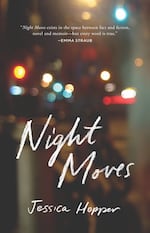
Music critic Jessica Hopper's new memoir, "Night Moves," is out now.
Courtesy David Sampson
Music critic Jessica Hopper has been lighting up bands since the age of 15, when she burst onto the Minneapolis underground scene with the zine "Hit It or Quit It."
Her subsequent two-decade odyssey through music scenes in Los Angeles, Seattle and Chicago has been nothing short of stellar, with stints at Punk Planet, The Chicago Reader, Village Voice, Pitchfork, MTV News and more.
Her new memoir, a collection of essays called "Night Moves" (University of Texas Press), tells a quieter but equally compelling story about Hopper's years as a young adult, getting her grounding as a writer in a rapidly gentrifying Chicago.
"Chicago," she writes, "is so Chicago. It’s like getting mashed in the face with a book of Sandburg poems."
She chronicles riding around the post-industrial landscape on bikes with friends, many of whom are, like Hopper, somewhat adrift as they try to bring their ambitions to life.
We spoke with Hopper about the period covered by "Night Moves," and her work. Find her at Beacon Sound in Portland on Saturday, Sept. 29, in conversation with Laura Veirs.
Q&A with Jessica Hopper
April Baer: Will you tell us about growing up in Minnesota and how the music scene there informed what you wanted to write about?
Jessica Hopper: When I was coming up in Minneapolis, in the punk scene of the early '90s, something that was really impressed upon me from the get-go was that you were expected to participate. That might mean being in a band. It might mean putting on shows. It might be putting out your friends' demos or 7-inch records. For me it was doing a fanzine. It was such a small music scene that anybody who was just going to shows wasn't doing enough to keep it alive.
This was a sort of pre-Internet era and, at that point, the American underground touring routes weren't even that well-established. That really stuck with me, and it shaped my taste for loud, noisy punk rock bands. Bikini Kill was just starting to happen, and there was a lot of great discord bands. Fugazi was particularly important to me, but there were also a lot of local bands that I cared really deeply about, particularly Babes in Toyland. Being able to see other women really express themselves was incredibly vital to me and underscored my sense of what I could do.
Baer: Can you give us the download on how you ended up in the Northwest for a couple of years?
Hopper: I'm not really interested in talking about that.

Critic Jessica Hopper's love letter to Chicago covers the time she spent there in the mid-2000s.
Courtesy of University of Texas Press
Baer: “Night Moves” feels like the book that everybody wants to write about their young adulthood, stories about how small things take on large meaning and how large things have this seamless coexistence with totally mundane stuff. How did you do this?
Hopper: I kept up really diligent blog at time, so some of it comes from that, and some of it comes from contemporaneous notes. And then some of it comes from the faulty building blocks of memory and what seems important to me now in retrospect. There are a few points in the book where I'm very much in the seemingly impossible struggle of it, at the time. Basically making my living one $60 check at a time and DJing kind of sad parties to make my rent.
At the time [Chicago] had super cheap rent that allowed me to spend a lot of time reading and a lot of time writing. What I was trying to do was give myself an education. As I got older, I came to see that that wasn't a period of failure, that it was really a formative place that allowed me to become the writer that I am.
Baer: You don't really talk about it head-on, but there are references in the book to your sobriety. You're in all these rock scenes, and you're the one who is like, “Water, please, easy on the ice." Do you think you perceive nightlife and [music] scenes differently without alcohol in your life? What kind of different perspective does that give you on what's going on?
Hopper: Yeah, I mean, I came up in Minneapolis, which is a legendarily boozy scene, and then when I moved to LA I joined a band with a couple of women who were all in AA at the time, and so they were the first sober people that I had ever met.
I was just like, “Wow, they really have their lives together and they really get stuff done.” I didn’t have to hang out at the bar and have the same conversation with them over and over about something we're going to do, that never gets done. And so, when I was about 19, 20 years old, I just decided I didn't want to drink. I was in all of these scenes and shows and bars and DJ nights and sketchy warehouse parties that I write about because I was so present. And sometimes, because I felt I was very much alone, it just really made me a very keen observer. It was really a force for both observation and productivity.
Baer: You have a number of essays that deal with death and loss. I could tell that you were thinking about those things in the time “Night Moves” covers.
Hopper: Much like what's happening today, we grew up [during] a huge boom of heroin in the music scene. And by the time I was 20, a half a dozen people that I cared very much about head died from drugs or died from suicide related to their drug addiction. And I think I just knew at a really young age, I was very aware of how finite life seemed to be. Maybe that's sort of what informed that awareness of, of death in the book.
Baer: Are there things that you'll try now with your writing that you would not have done as a younger writer?
Hopper: You know, when I wrote some of these things initially I wanted to be charming and funny and dazzling. I wanted people to like my writing — not to say I don't have that investment now! But it's really different. I don't really have fear around my writing. I'm writing for myself, and for the people that are digging to find the sort of story I'm telling. I think that's the primary difference between now and then.
